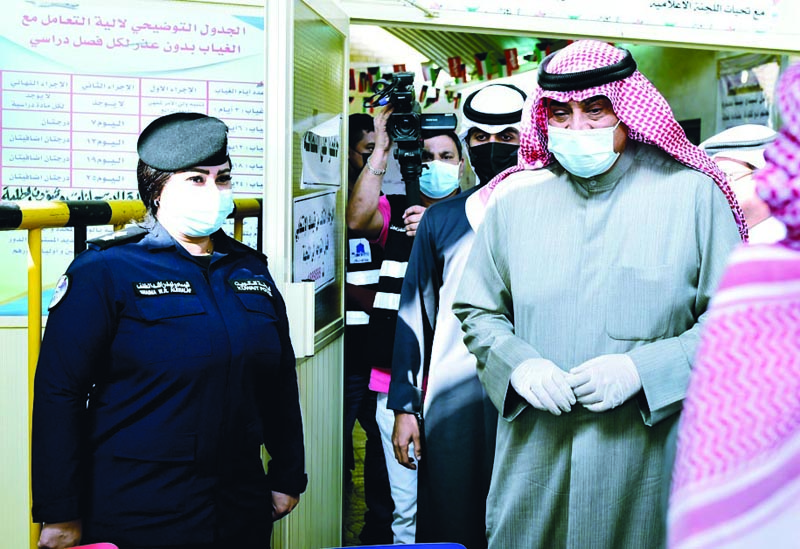
KUWAIT: His Highness the Prime Minister Sheikh Sabah Al-Khaled Al-Hamad Al-Sabah said he was satisfied with medical preparations for yesterday's parliamentary elections, which were "different than the previous 60 years." These elections were "different than the previous 60 years because of the health crisis and the measures that needed to be adopted," His Highness the Prime Minister told reporters while visiting Khabab Ibn Al-Arat school in Jabriya, which was made a polling station.
"I am happy with the reports I have been receiving about the participation in this constitutional procedure to elect representatives of the Kuwaiti people," he said. "We see a big turnout and we hope to see compliance with the health requirements during elections, and to refrain from celebrations following the announcement of results," said His Highness the Prime Minister. "The victory is for us to preserve public health," he added. His Highness the Prime Minister was accompanied by Ministry of Interior's Undersecretary General Essam Al-Naham.
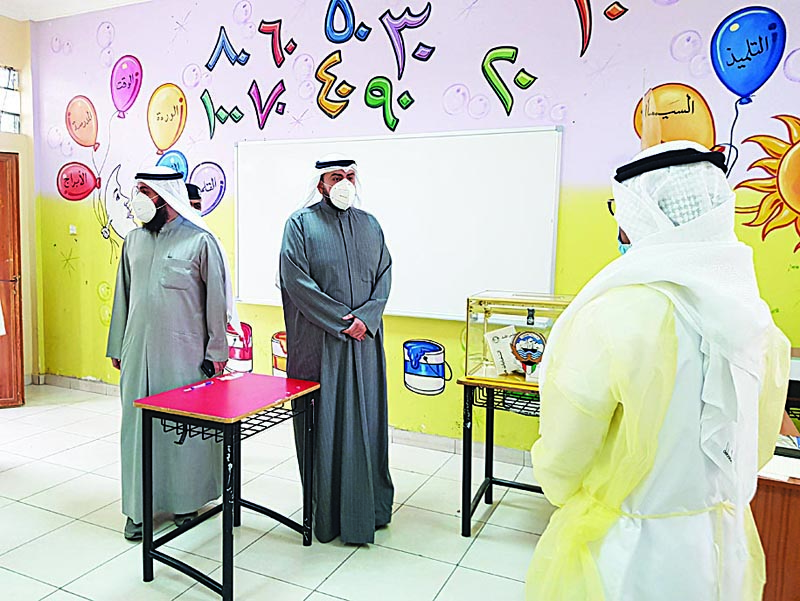
Minister of Health Sheikh Dr Basel Al-Sabah tours the Bin Rushd School in Al-Faiha. 
Minister of Health Sheikh Dr Basel Al-Sabah tours the Bin Rushd School in Al-Faiha.
Minister of Health Sheikh Dr Basel Al-Sabah had meanwhile underlined the importance on abiding by the electoral process and adhering to the precautionary measures setup in order to maintain safety for all and to reach the desired results. Sheikh Basel made the remarks after a tour in Bin Rushd School Committee in Al-Faiha, which is an area designated for coronavirus patients, adding that he made several tours to various schools with each of the Minister of Interior, the Minister of Justice and other senior officials of the Ministry of Interior to check on the extent of commitment to follow health procedures.
The minister mentioned that he witnessed at first hand the extent of everyone's response in following health procedures and requirements despite the fact that some schools witnessed some large crowds in specific periods, noting that the committees witnessed physical distancing and the commitment by voters to wear masks.
Kuwaiti voters infected with COVID-19 practiced their democratic right despite the disease. The government had allocated one polling station in each of the five constituencies for COVID-19 patients who were in quarantine, where they could cast their ballots in a safe environment. People who were in quarantine were instructed to take a permission to go vote through Shlonik smart phone applications. Ministry of Health spokesman Dr Abdullah Al-Sanad had urged infected voters to always wear masks and avoid removing the masks unless requested by officials supervising the voting process, and then return home immediately after casting the ballots.
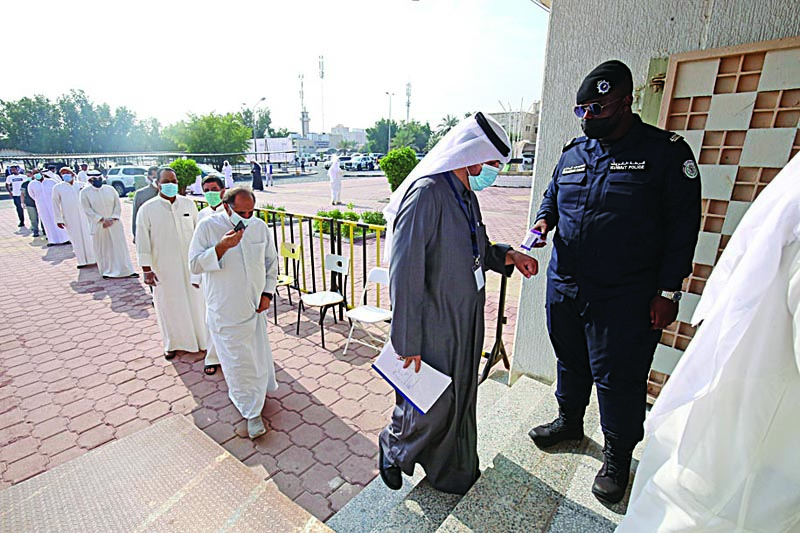
Kuwaiti men, wearing protective masks amid the COVID-19 pandemic, have their temperature checked before entering a polling station. 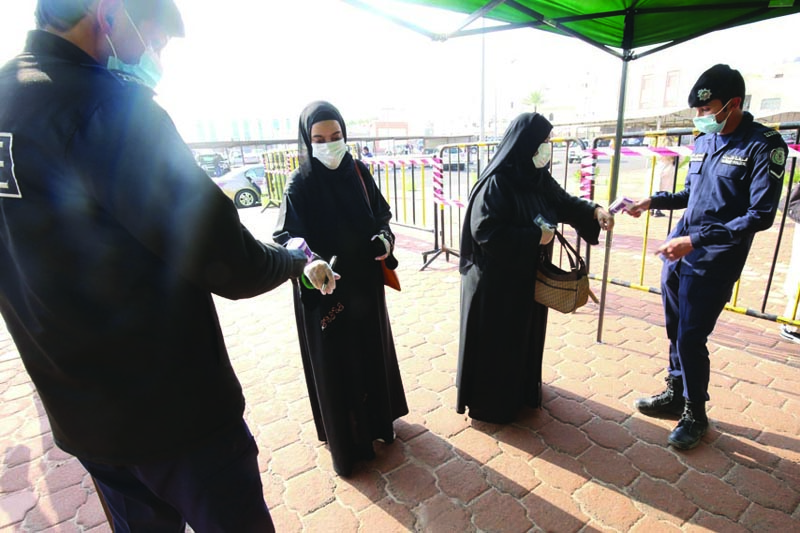
Kuwaiti women, wearing protective masks amid the COVID-19 pandemic, have their temperature checked before entering a polling station.
Adherence to precautions
Officials running parliamentary elections in the second constituency expressed satisfaction over the level of adherence to the anti-coronavirus precautions. The voting kicked off early yesterday, starting with elderly citizens amid full abidance by the anti-COVID measures, said judge Khaled Al-Busairi, head of the main electoral commission at Al-Asmaa bint Al-Hareth School, one of the schools that have been transformed into voting centers.
All who turned up to cast their votes wore protective masks, Busairi said, while Justice Ahmad Al-Hajri, in charge of the main commission at Ibn Rushd School in Faiha that was dedicated solely for eligible voters who have been infected with the coronavirus, affirmed that all people that were present at the station wore masks, gloves and maintained social distancing. Voters entering the center were obliged to change their masks and put on the gloves before being subjected to a temperature test, Hajri said.
Minister of Justice Dr Fahad Al-Afasi affirmed that parliamentary elections had proceeded smoothly and without any obstacles due to excellent efforts by personnel of all involved state departments. In a statement to the press, Dr Afasi, also Minister of Awqaf and Islamic Affairs, said personnel of the ministries of justice, interior and health, played a key role in facilitating the electoral process.
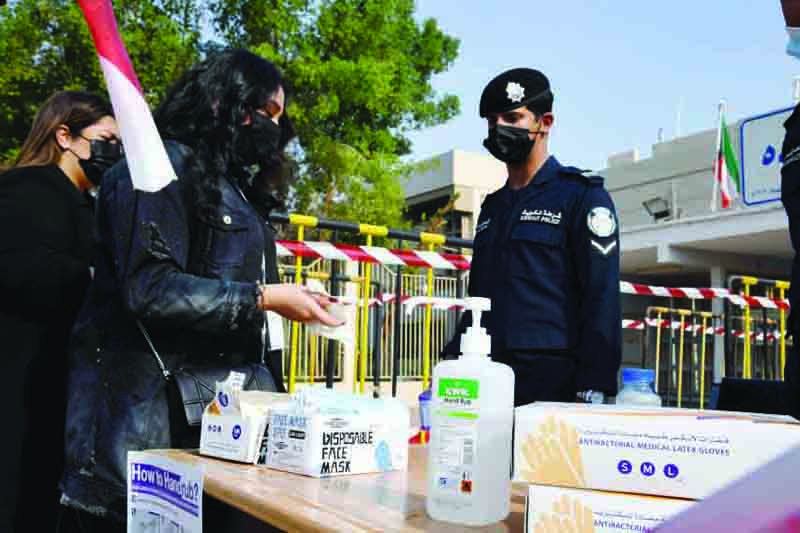
A police officer looks on as voters put gloves on before entering a polling station. 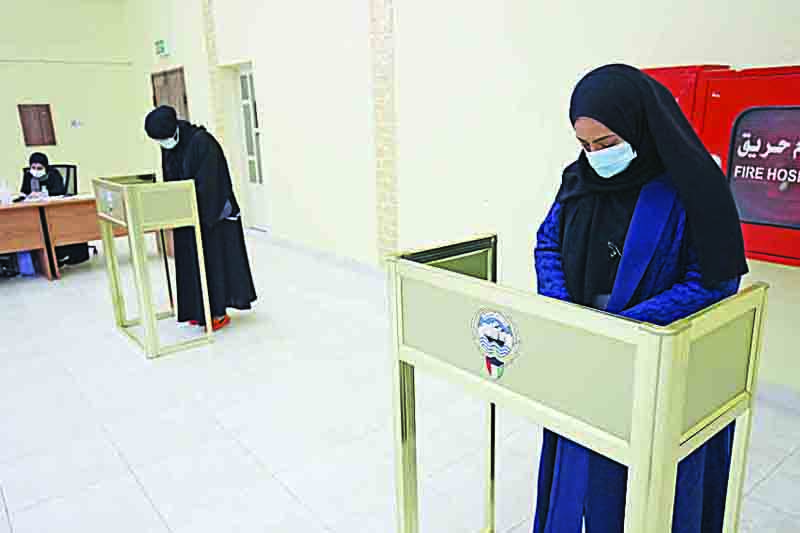
Kuwaiti women, wearing protective masks amid the COVID-19 pandemic, cast their ballots at a polling station.
Members of the electoral commissions, namely judges and personnel of the judiciary, have exerted extraordinary efforts in the shadow of the health measures due to the novel coronavirus. This high turnout since early hours of the balloting affirms the Kuwaiti citizens' awareness of their constitutional rights and positive interaction with public affairs of the homeland, he said.
Rigorous planning preceded Kuwait's parliamentary elections to ensure it would be in line with the country's 'favorable image,' Kuwait Municipality Chief Ahmad Al-Manfouhi said, describing the vote as a 'democratic spectacle.' "We face a legal and constitutional obligation to hold these polls," the official said, adding that His Highness the Prime Minister has personally surveyed polling stations since the wee hours of morning to ensure the smoothness of the electoral process.
Manfouhi, who heads a government committee in charge of national health precautions, pointed to the "plummeting numbers" of coronavirus cases in Kuwait, which proves "large-scale compliance" with health guidelines. Designating polling centers for voters carrying the virus has been among measures the health ministry has taken to avert a resurgence of the pandemic in the wake of the vote, he added. Expressing his satisfaction with the voter turnout, the official went on to commend the electorate for keeping health precautions in mind as they cast their ballots.










